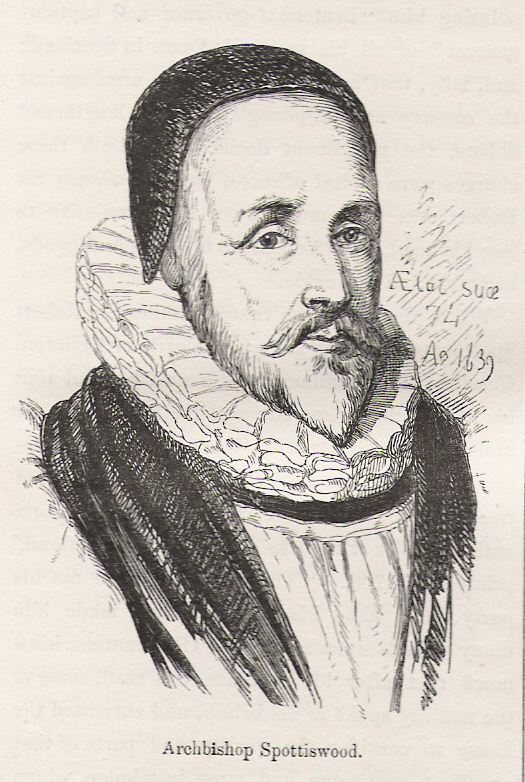- John Spottiswoode
Infobox Archbishop
honorific-prefix =
name = John Spottiswoode
archbishop_of = Archbishop of St Andrews
honorific-suffix =

caption =
ordination =
consecration =
enthroned = 1615
ended = 1639
province =
diocese =
see =
predecessor =George Gledstanes
successor =James Sharp
birth_name =
birth_date = 1565
birth_place =Mid Calder ,West Lothian ,Scotland
death_date = death date|1639|11|26 (aged 74)
death_place =London ,England
buried =
nationality =
residence =
parents = John Spottiswoode and unknown
spouse = Rachel Lindsay
children = John Spottiswoode, Robert Spottiswoode (1596-1646), Anne Spottiswoode
ocupation =
profession =
religion =Church of Scotland
alma_mater =
John Spottiswoode (Spottiswood, Spotiswood or Spotswood) (
1565 -November 26 ,1639 ) was an Archbishop ofSt Andrews , Primate of All Scotland and historian ofScotland .He was born in 1565 in
Mid Calder ,West Lothian ,Scotland , the eldest son of John Spottiswood, minister of Calder and "superintendent" ofLothian . He was educated at theUniversity of Glasgow (MA 1581), and succeeded his father in the parish of Calder in 1583. In 1601 he attended Ludowick, Duke of Lennox, as his chaplain, in an embassy to the court of France, returning in 1603. He followed James to England on his accession, but was the same year nominated to the see of Glasgow, his consecration in London, however, not taking place until October 1610.Spottiswoode had originally become prominent as an ardent supporter of the strict
Presbyterian party, but gradually came to see the inconveniences of "parity in the Church," attributed little importance to the existing matters of dispute, and thought that the interests of both church and state were best secured by keeping on good terms with the king. He was therefore ready to co-operate with James in curtailing the powers of the Kirk which encroached on the royal authority, and in assimilating theChurch of Scotland to that of England. OnMay 30 ,1605 he became a member of theScottish Privy Council . In 1610 he presided as moderator over the assembly in which presbytery was abolished, in 1615 he was madeArchbishop of St Andrews and primate of Scotland, and in 1618 procured the sanction of the privy council to theFive Articles of Perth with their ratification by parliament in 1621.In 1633 he crowned Charles I at Holyrood. In 1635 he was appointed
Lord Chancellor of Scotland , an office which he retained till 1638. He was opposed to the new liturgy as inexpedient, but when he could not prevent its introduction he took part in enforcing it. He was a spectator of the riot of St Giles, Edinburgh, onJuly 23 ,1637 , endeavoured in vain to avoid disaster by concessions, and on the taking of the Covenant perceived that "now all that we have been doing these thirty years past is thrown down at once." He escaped to Newcastle, was deposed by the assembly onDecember 4 on a variety of ridiculous charges, and died in London on1639-11-26 , receiving burial inWestminster Abbey on1639-12-02 .Spottiswoode published in 1620 "Refutatio libelli de regimine ecclesiae scoticanae", an answer to a tract of Calderwood, who replied in the "Vindiciae" subjoined to his "Altare damascenum" (1623). The only other writing published during his lifetime was the sermon he preached at the Perth assembly. His most considerable work was "The History of the Church and State of Scotland" (London, 1655, seq.). It displays considerable research and sagacity, and even when dealing with contemporary events gives a favorable impression, upon the whole, of the author's candour and truth. The opposite side can be studied in Calderwood's "History".
Family
Spottiswoode married Rachel, daughter of David Lindsay,
bishop of Ross , with issue a daughter and two sons:
*Anne Spottiswoode
*SirJohn Spottiswoode of Dairsie in Fife
*Sir Robert,Lord President of the Court of Session (1596-1646), who was captured at thebattle of Philiphaugh in 1645 and executed on1646-01-20 .ources
*the accounts prefixed to the first edition of Spottiswoode's "History of Scotland"
*the accounts published by the Spottiswoode Society in 1851
*David Calderwood's "Hut, of the Kirk of Scotland" (1842-1849).ee also
*
Alexander Spotswood - the noted Lieutenant-Governor of Virginia , who was grandson of Robert Spottiswoode (1596-1646) and great-grandson of Archbishop John Spottiswoode.References
*1911
Wikimedia Foundation. 2010.
